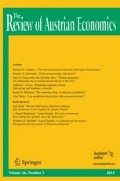In the late 1970s, James Buchanan argued that future progress in economics and political economy will come from the conciliation, not conflict, of the research traditions of property rights economics, law and economics, public choice economics, and market process economics. He also argued that this program would meet resistance from the orthodoxy, and that it will require acts of academic entrepreneurship and the establishment of various footholds throughout the academic world.
In 1986, after receiving the Nobel Prize, Buchanan discussed how his recognition gave hope to those at the edge of the academic establishment, and how he hoped it would inspire them to appropriately challenge the orthodoxy.
Public choice analysis has influenced economics, political science, law, and history. Institutes, centers, associations, outreach seminars, book series, and journals have all emerged over that 30 year period since Buchanan’s Nobel Prize to encourage, support, and communicate research and education in the field of political economy proper throughout Europe, North America, Latin America, and Asia.
In October 2016 the F. A. Hayek Program for Advanced Study in Philosophy, Politics, and Economics at George Mason University celebrated Buchanan’s achievement and the implications for the field of political economy with a collection of papers. Two of the papers presented as part of that celebration follow. Michael Munger discusses the three main foundations of Public Choice theory and develops Buchanan’s theory of politics as exchange. David Schmidtz contends that James Buchanan’s career offered a counter to the tendency of scholars to narrowly specialize by practicing moral philosophy as it had been done in the past.
Buchanan’s call for an integration of property rights, law and economics, public choice, and market process economics still requires intellectual entrepreneurs to act boldly to challenge the conventional wisdom methodologically, analytically, and social-philosophically. Buchanan remains in my opinion the exemplary scholar in modern political economy. But one thing he never did was rest on his laurels. In fact, he continued to work hard at his craft until his death. In August of 2012, Buchanan gave a paper at GMU and after he commented to me that “he didn’t think his paper worked and that he had to do some revising.” At the time Buchanan was 92 years old and he was still working to revise and improve his argument. We can only hope all of us maintain this sort of attitude to the end. It reflects a fundamentally curious and active mind, and a dedication to the craft of research and writing. If the past 30 years have given us anything, it is that advances in political economy follow from unleashing curiosity, enlisting active minds, and demanding clarity of thought and clarity of exposition. Let us continue along this path.
As Buchanan would have put it – onward and upward.
Author information
Authors and Affiliations
Corresponding author
Rights and permissions
About this article
Cite this article
Boettke, P.J. 30 Years since the Nobel prize. Rev Austrian Econ 31, 149–150 (2018). https://doi.org/10.1007/s11138-018-0416-5
Published:
Issue Date:
DOI: https://doi.org/10.1007/s11138-018-0416-5

